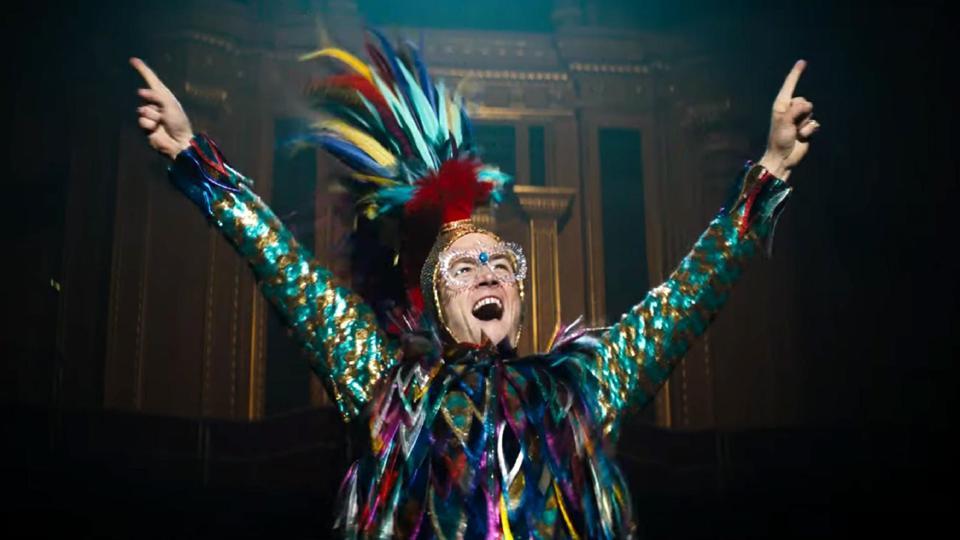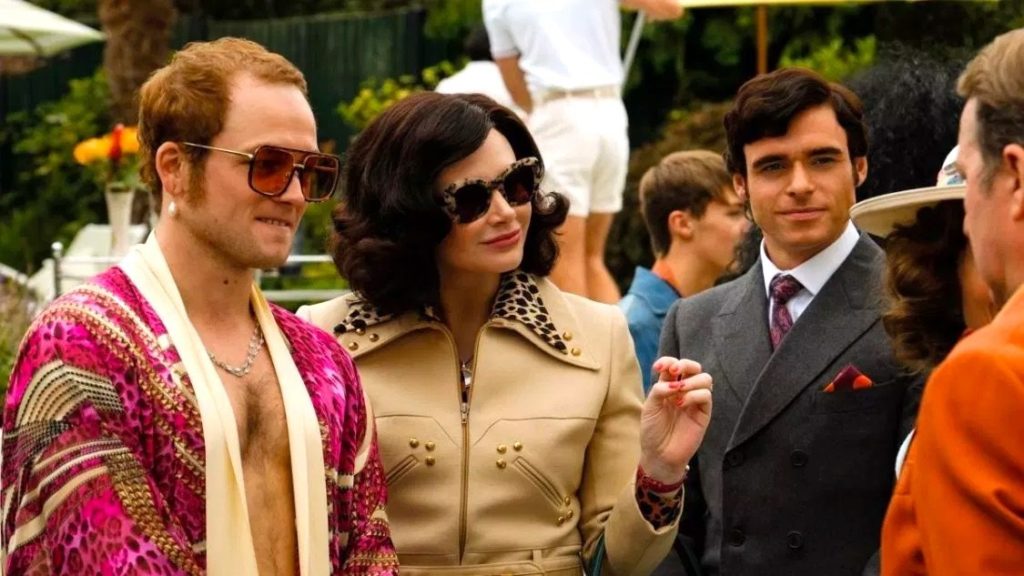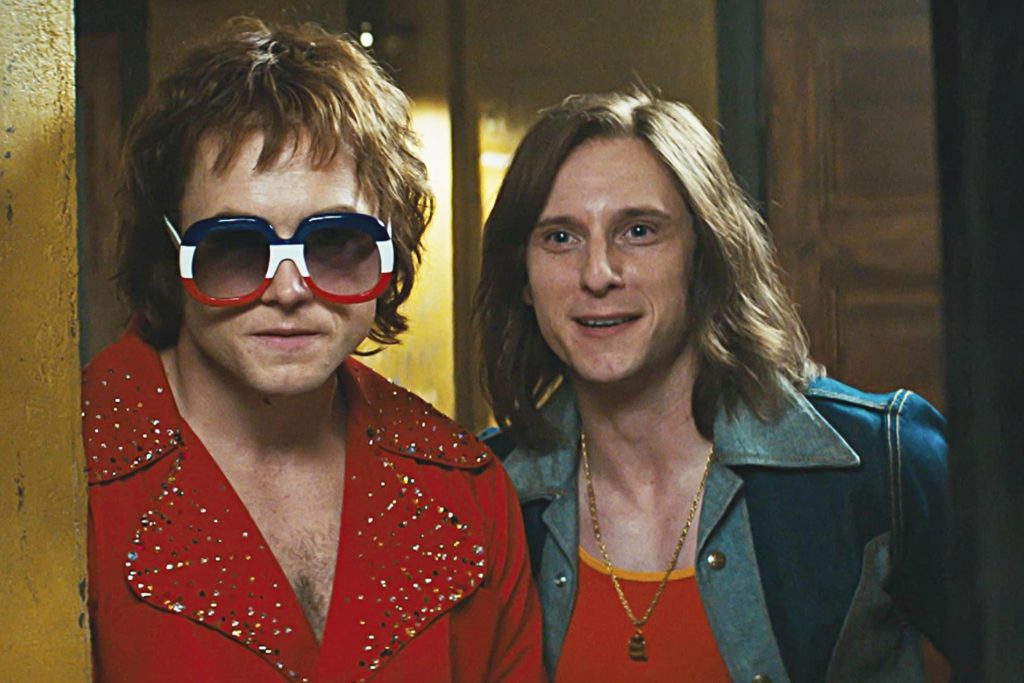
They say a great pop song can lift you up, but at one point in Rocketman, the audience actually levitates, their shared delight elevating them into midair. We’re at The Troubadour in 1970s Los Angeles, and the flamboyant piano player is treating the crowd to an exuberant rendition of “Crocodile Rock”. As he bangs the keys and belts out the tune—about him and Susie, holding hands and skimming stones—you too might find yourself propelled upward, borne on the dynamism of the music and the enthusiasm of the performance.
When are you gonna come down? Soon enough. Every so often, Rocketman—Dexter Fletcher’s occasionally extraordinary but largely straightforward new film about Elton John—taps into that spirit of joyous communion, the rapturous feeling of losing yourself in art. But gravity regularly gets the best of it, and when it falls back to Earth, it reveals itself as yet another product plucked from the biopic assembly line. John was a provocative and often dazzling performer, but underlying his on-stage extravagance was music with real originality and heart. Rocketman, by contrast, tends to feel like a magic trick; its presentation, however skillful and virtuosic, seems designed to disguise its inherent flimsiness and familiarity.
Still, let’s not dismiss that virtuosity. Fletcher, who replaced Bryan Singer after he was fired from Bohemian Rhapsody—a movie to which Rocketman will inevitably be compared, and which I decidedly did not hate—does more than dutifully assemble John’s discography into a greatest-hits compilation. He instead takes pains to weave his subject’s music into the film’s very fabric, and to translate his signature panache into cinema. And so, as Rocketman’s opening act moves quickly from John’s timid preteen years to his cocksure twenties, Fletcher presents the obligatory transition between actors via a unified performance of “Saturday Night’s Alright for Fighting”, beginning with the preteen Elton, née Reg Dwight (played as a boy by Matthew Illesley and then by Kit Connor), showing off his glissando at a dive bar, then sprawling out into the streets of London, where he ages suddenly and persuasively into the boisterous figure of Taron Egerton. It’s a bravura sequence, one that cannily smuggles narrative development into a raucous musical number full of gaudy costumes and striding dancers. There’s discipline in the aggravation.

Maybe too much discipline. Rocketman tends to be at its best when it’s at its rowdiest, when it unfastens the clamps of the typical biopic structure and just lets Egerton let it rip. But despite being marketed as a “true fantasy” (oh how it feels so unreal!), the movie clings to the traditional template with a fierceness that borders on insecurity; the screenplay, by Lee Hall (War Horse), seems compelled to balance out the flights of musical fancy with tedious and familiar scenes of ham-fisted conflict and clunky exposition.
There has to be a twist! Except there isn’t. Instead, there is everything you might expect from a film that dramatizes the life of a legendary artist, particularly when that legend just happens to serve as one of its executive producers. There is the early skyrocketing to fame and fortune, followed by the infighting and the struggles with substance abuse. There is the predatory manager (Richard Madden) who seduces the star with whispers of future glory, then proves to be a venal, exploitative asshole. There are daddy issues—at one point, the young Elton actually asks his disapproving father (Steven Mackintosh), “When are you going to hug me?”—as well as mommy issues. (For the latter, Bryce Dallas Howard dons a black wig and a British accent; as usual, she’s quite good.) There is even a ridiculous framing device, with Elton narrating the story after barging into an AA meeting in full regalia; the other addicts, naturally, have no lives of their own but are merely stand-ins for you, the rapt audience.

What there isn’t—and what Bohemian Rhapsody, for all its faults, genuinely attempted to explore—is any real insight into John’s creative process. Rocketman does efficiently detail the lifelong partnership between John and Bernie Taupin (a somewhat handcuffed Jamie Bell), the lyricist who provided the prosaic words that John then set to magnificent music. But it envisions John as such a gifted prodigy—he can sit at a piano bench with a fresh sheet of lyrics and compose a hypnotic melody within moments—that the end result feels like a cheat. It may be an accurate representation of John’s abilities, but it prevents us from truly getting inside his head.
Then again, the end result is what Rocketman does best; its gift is its songs, and they’re all for us. Liberated from the idiotic Kingsman franchise, Egerton delivers a performance of enjoyable brio, showcasing a full-bodied voice to match his flashy gestures and mannerisms. And Fletcher orchestrates the tunes with variety as well as flair, treating us to a symphony of playful duets, killer jams, and wistful ballads. Some of the tracks will inevitably make cinephiles think of their appearances in better movies—“Tiny Dancer” in Almost Famous, “Your Song” in Moulin Rouge!—but that doesn’t diminish their earworm quality. If Rocketman is in some ways a concert film, at least it features an expertly curated set list.

It is also, as far as these types of movies go, reasonably economical; rather than spanning a long long time, it centers on a relatively succinct period in John’s early career, when his celebrity fed his compulsions. Perhaps the most startling arc involves his short-lived marriage to Renate Blauel (Celinde Schoenmaker), a three-year union that Fletcher boldly compresses into a matter of minutes, with a single silent breakfast representing a lifetime of misunderstanding and regret. And overall, the movie is appropriately frank in depicting John’s homosexuality, even if the brief sex scenes fail to generate any actual heat.
In fact, real heat is hard to find in Rocketman, beyond its well-executed and sometimes exhilarating musical sequences. Its story of redemption—he shall be a good man!—is suitably uplifting, but its trajectory is so predictable that it drains the film of its manufactured energy. There’s never been another musician like Elton John, but there have been countless movies like Rocketman, which only grows safer and more conventional as it goes along. It’s a sad situation, as it gets less and less absurd.
Grade: C+
Jeremy Beck is the editor-in-chief of MovieManifesto. He watches more movies and television than he probably should.
